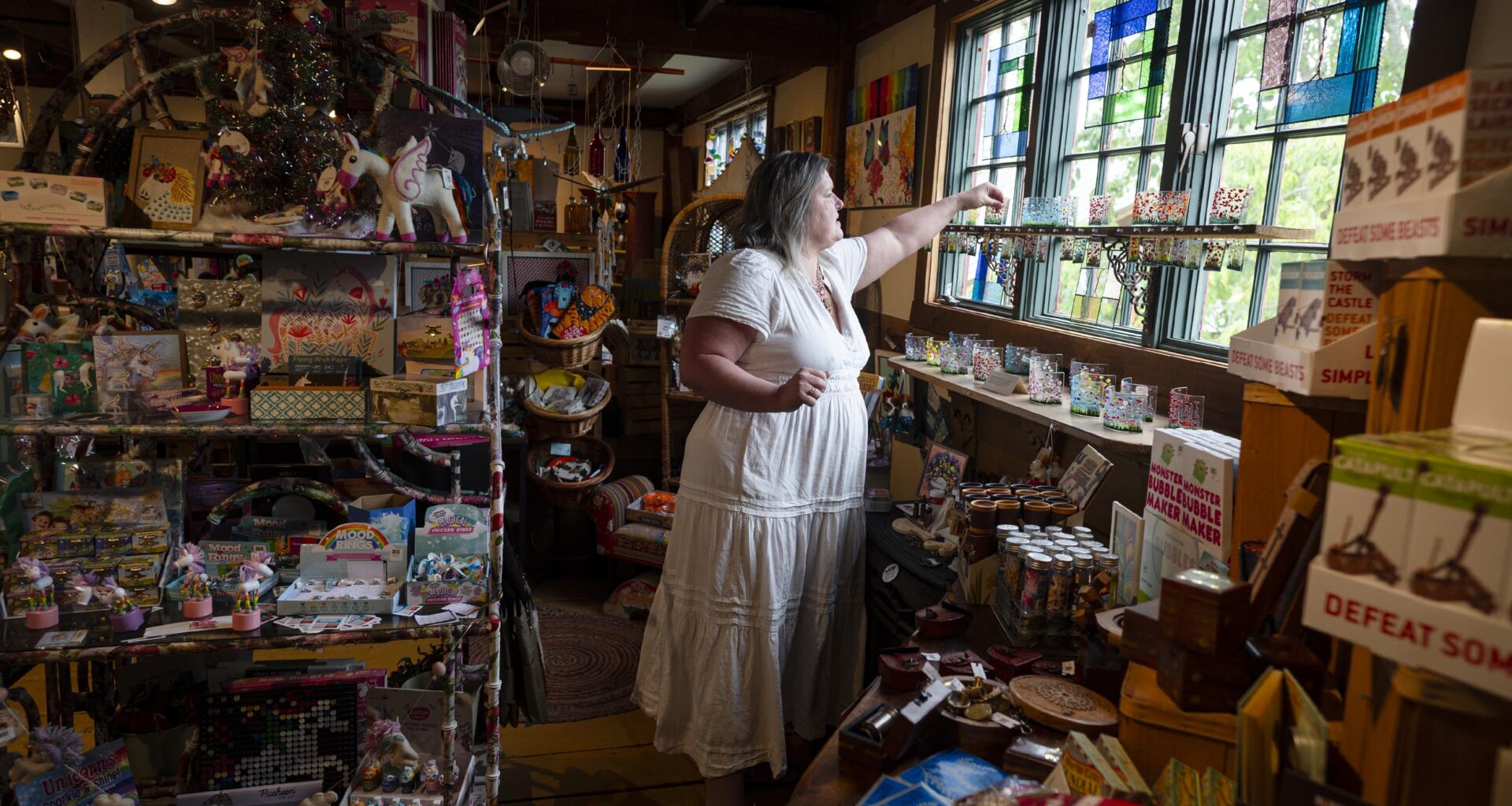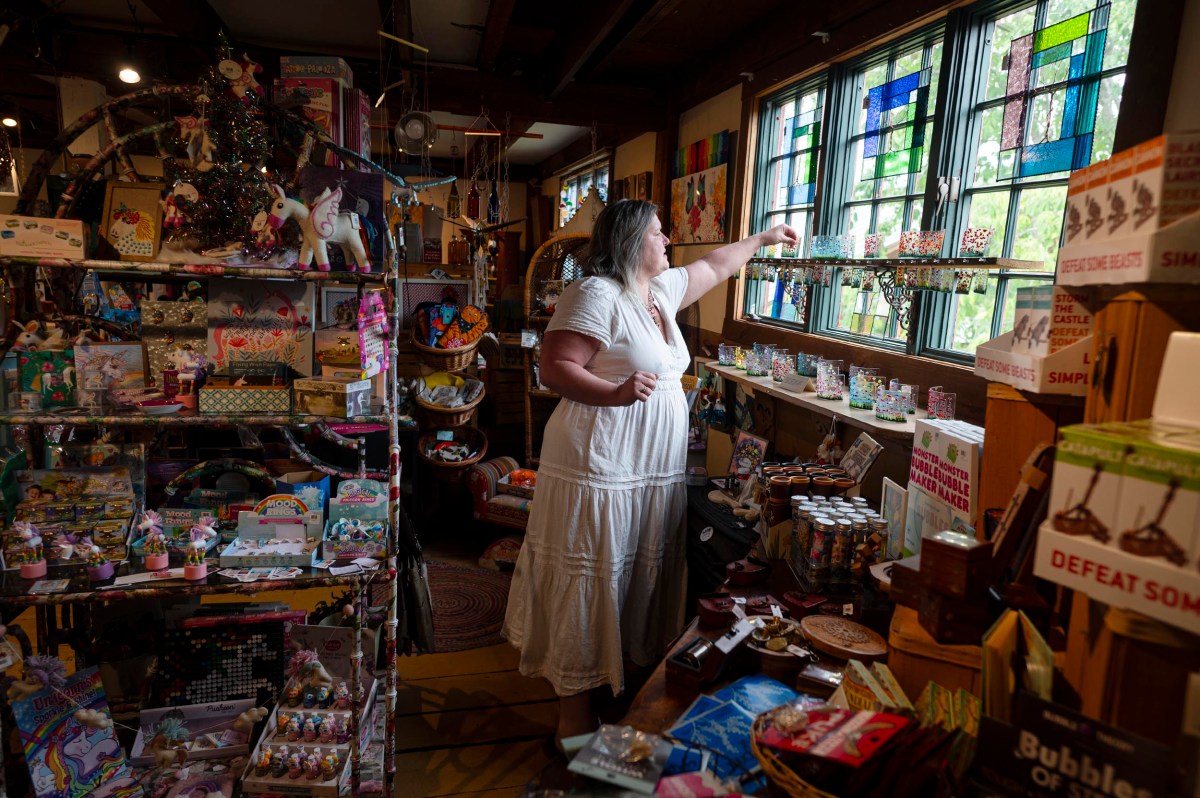 Stacy Harshman, owner of the Sparkle Barn in Wallingford, is worried about the effects of tariffs on the products she buys from international artisans. Seen on Tuesday, Aug. 19. Photo by Glenn Russell/VTDigger
Stacy Harshman, owner of the Sparkle Barn in Wallingford, is worried about the effects of tariffs on the products she buys from international artisans. Seen on Tuesday, Aug. 19. Photo by Glenn Russell/VTDigger
Stacy Harshman describes her dairy-barn-turned-gift-shop in Wallingford as a “surprising dose of wow.”
The Sparkle Barn is a pop of bright color along a quiet, mostly rural stretch of Route 7 in Rutland County. The first floor is filled with “eclectic gifts,” Harshman said, while the second serves as an Alice in Wonderland-inspired art installation called “the bloom room.”
“I’m an artist, and my right hand lady (and) retail manager, she’s an artist,” Harshman said. “So I consider the Sparkle Barn an oasis. A lot of people describe it as magical.”
The store sources many of its products from Vermont and other New England artists, but other products come from artists around the world. It’s that portion of her sales that has Harshman worried for the future of her store.
President Donald Trump announced various tariffs on different products and countries beginning in March, but until now, many small businesses have fallen under an exemption called the “de minimis” rule. Essentially, orders under $800 were not subject to the duties and fees of the tariff schedule, according to the National Foreign Trade Council.
That exemption is coming to an end. Due to an executive order from Trump, beginning Friday, all imports into the United States will be subject to the same duties, regardless of the size of the order.
Trump argued the de minimis exemption allowed for the illegal import of fentanyl into the country, when he signed the executive order at the end of July. Amy Spear, president of the Vermont Chamber of Commerce, said the decision also appeared to target foreign e-commerce websites like Shein and Temu.
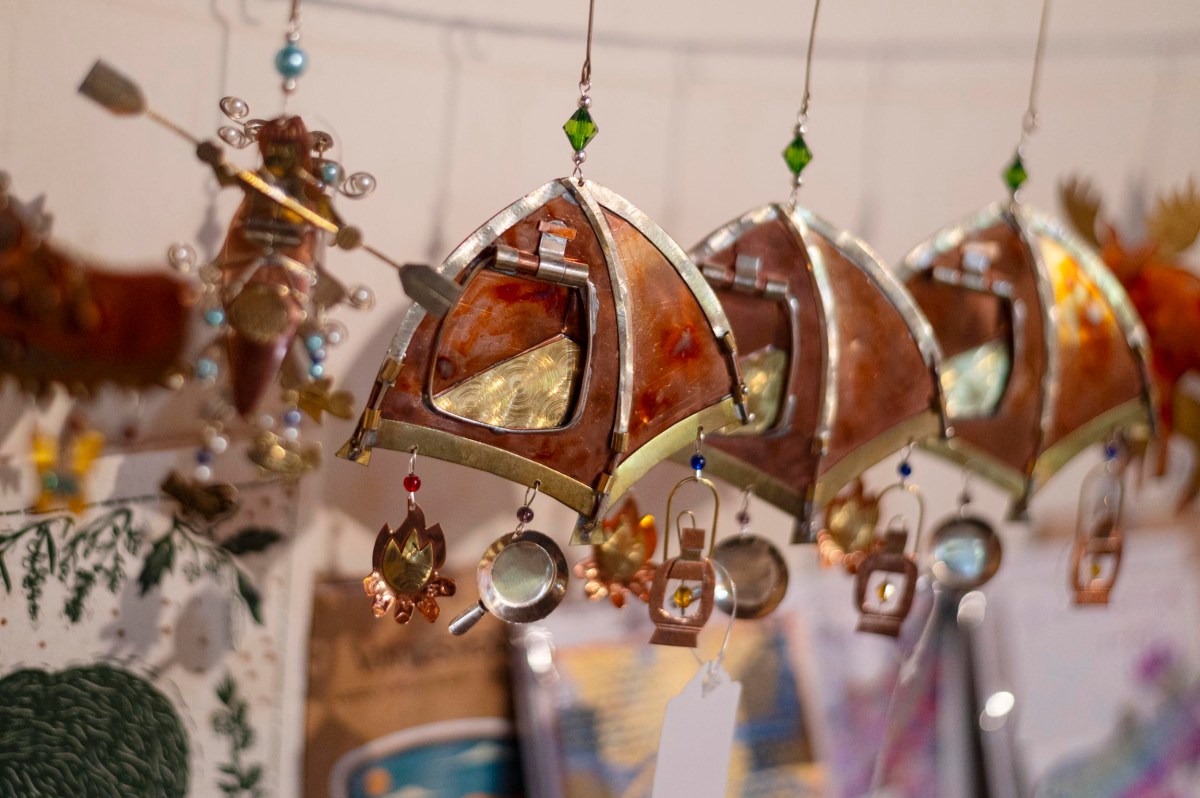 Stacy Harshman, not seen, owner of the Sparkle Barn in Wallingford, is worried about the effects of tariffs on the products she buys from international artisans. These items, seen on Tuesday, Aug. 19. are from Korea. Photo by Glenn Russell/VTDigger
Stacy Harshman, not seen, owner of the Sparkle Barn in Wallingford, is worried about the effects of tariffs on the products she buys from international artisans. These items, seen on Tuesday, Aug. 19. are from Korea. Photo by Glenn Russell/VTDigger
But regardless of the intent, Spear said, the end of the exemption could erode the thin margins of Vermont’s small businesses, especially artisans and small-batch producers.
“Our small businesses have gotten swept up in the foreign e-commerce firms that I think the federal government is trying to target,” she wrote in an email. “The end of it means that small businesses, artisans, et cetera, are going to have higher costs and new red tape that they’re going to have to go to when they’re looking at their supply chain.”
Harshman said some of her most popular products are imported, and she is only beginning to understand how the end of the exemption will affect their prices.
The Sparkle Barn has imported hand-illustrated cards from an English artist named Fay and, so far in 2025, has sold more than 600 of her cards at $5 each. The next order would have an additional $80 tariff charge, adding about 27% to the price of the order, according to Harshman.
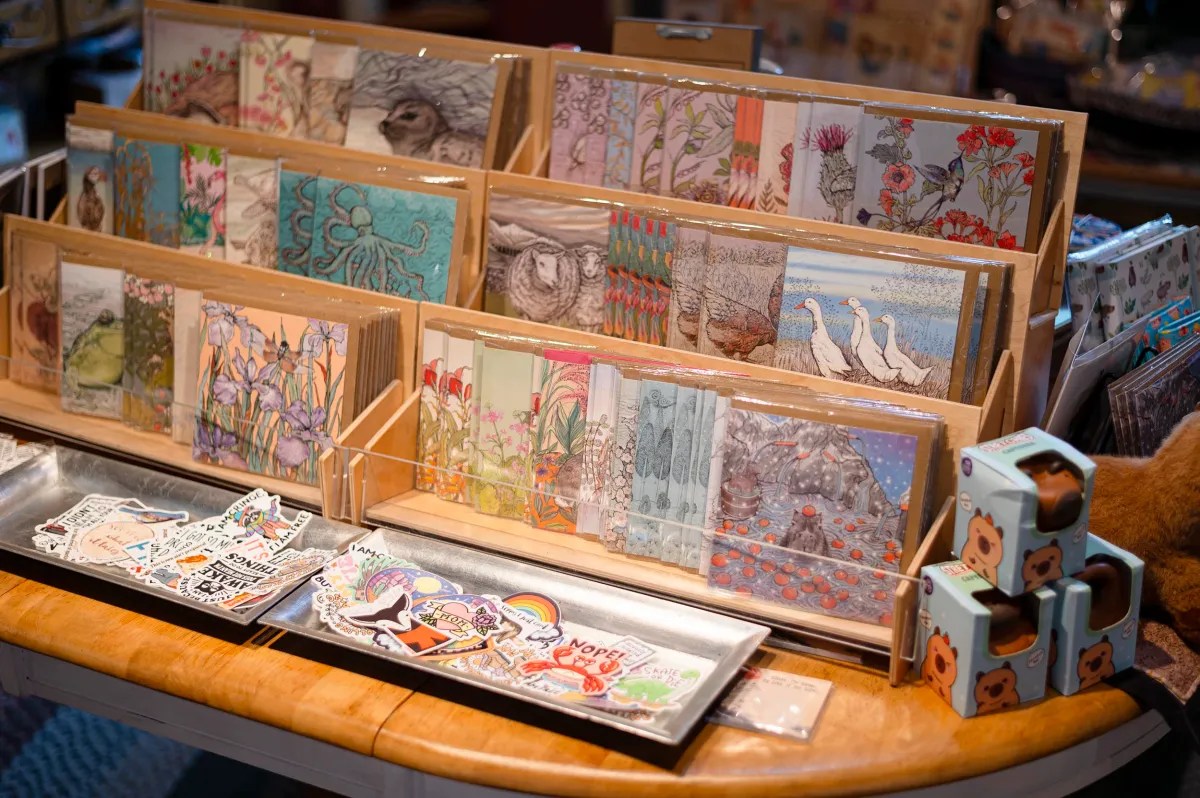
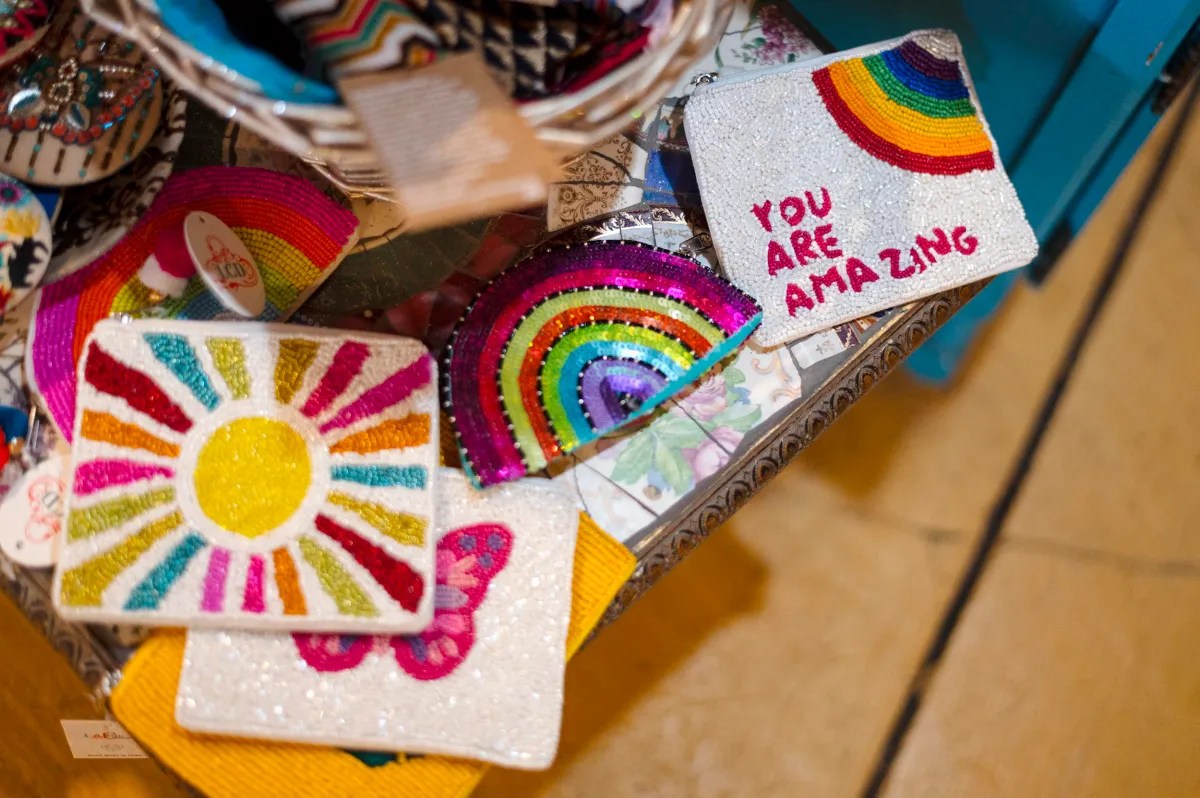
But it’s hard for her to predict exactly what the final charges might be. Last week, she said she was hit by a surprise fee on an order above the exemption from the United Kingdom. She expected the 10% general tariff rate, but administrative fees raised the total to 17%.
“Customs actually charged a $50 fee for billing us!” she wrote.
Harshman said it makes her sad to think she might have to end relationships she’s built with international artists, some of whom she has worked with for seven or eight years.
“I look around the shop and I’m like, ‘How much is this going to change our vibe?’” she said in an interview. “Because, you know, I have to make the decision: Do I keep carrying the item and raise the price, or is it something that is just not gonna work anymore?”
Harshman said she also is frustrated by the politicization of her business. When she posted on Facebook about her struggles, she received many supportive comments — but also accusations that she was “blasting democratic political screed” and overly simplistic suggestions that she simply buy more U.S.-based products, she wrote.
In fact, she has heard from the local artists that she works with that they, themselves, are facing higher costs for the materials they use to create their products.
“Even artists that are making it down the road in Wallingford … their materials are coming from overseas,” she said.
Spear said she’s heard of similar issues with maple syrup producers. Though maple syrup is well-known as a Vermont product, supplies like the tubes between trees or collection buckets may be sourced from overseas.
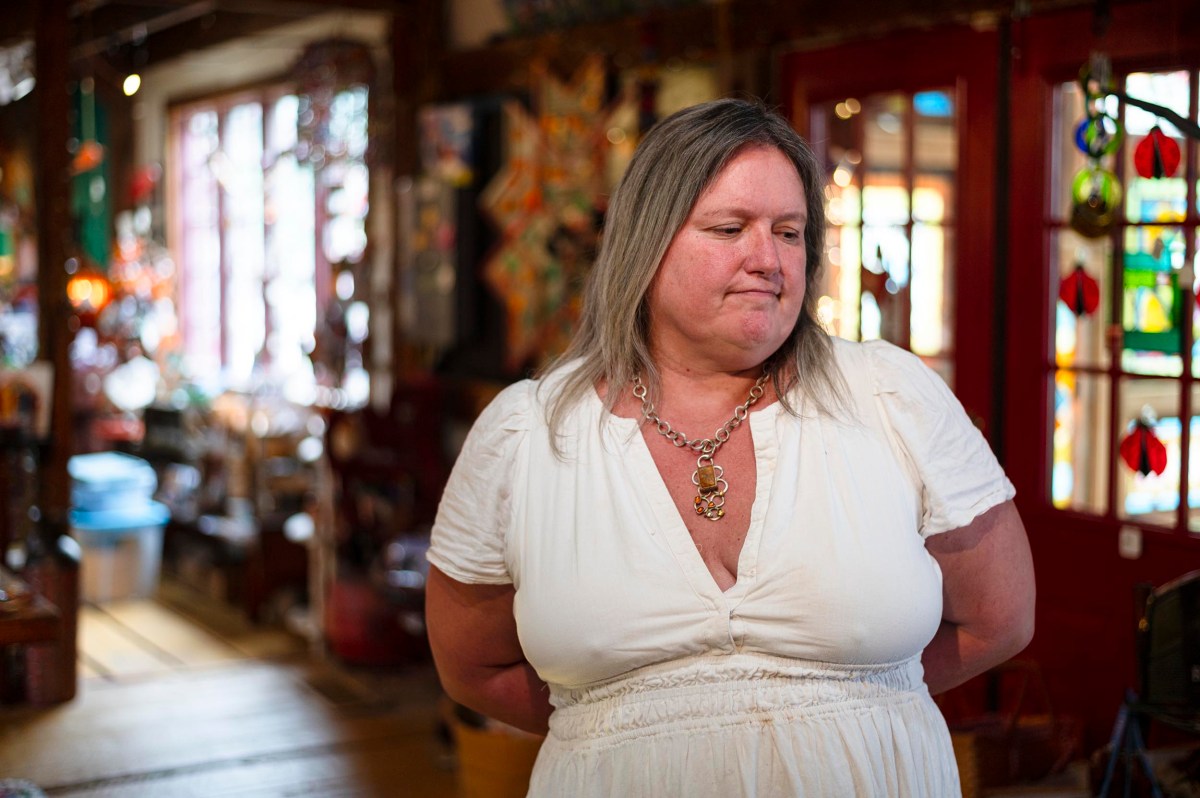 Stacy Harshman, owner of the Sparkle Barn in Wallingford, is worried about the effects of tariffs on the products she buys from international artisans. Seen on Tuesday, Aug. 19. Photo by Glenn Russell/VTDigger
Stacy Harshman, owner of the Sparkle Barn in Wallingford, is worried about the effects of tariffs on the products she buys from international artisans. Seen on Tuesday, Aug. 19. Photo by Glenn Russell/VTDigger
Erik Waring, owner of Erik’s Sugarbush in Kirby, said a recent order of a stainless steel tank from Canada came with a new stipulation: He had to sign a warning that the product may or may not have a tariff on it when it got to the United States.
He said he simply cannot afford to sink thousands of dollars into stockpiling equipment. As a small producer, he is already contending with stiff competition from larger companies that have the advantage of economies of scale.
“The deck’s stacked against the smaller producers, other than the fact that we should be selling our better, our best stuff, and put our best foot forward,” he said.
In Montpelier, the stationery and gift shop Magpie & Tiger offers a wide variety of international goods, from German notebooks to Korean paper stickers. Owner Elena Gustavson said many of the products she offers are not manufactured in the United States or are not manufactured to the same quality level.
“This country does not have the infrastructure, knowledge, or systems — and hasn’t for many, many years,” she wrote in an email.
She said she is now navigating “ridiculous” product codes and the federal tariff site to understand what her liabilities might be. She also is stockpiling what she can in preparation for the busier months of fall and winter.
But with little ability to absorb the additional costs, she believes she will have to stop importing many of the store’s international goods for now.
“To put small businesses, the heartbeat of their communities, through this political circus is beyond my understanding,” she wrote.
Clarification: Captions in a previous version of this story partially misrepresented Stacy Harshman’s job title.

